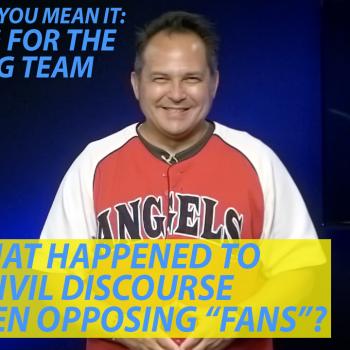
What is the Correct View of the Atonement?
Dr. Craig interacts with Greg Boyd on a proper view of the Atonement
 Reasonable Faith Podcast: What is the Correct View of the Atonement? (Part 1) Play Now | Play in Popup | Download
Reasonable Faith Podcast: What is the Correct View of the Atonement? (Part 1) Play Now | Play in Popup | DownloadKEVIN HARRIS: Hey, there. Welcome to the podcast. It’s Kevin Harris. This is Reasonable Faith with Dr. William Lane Craig. We’ve done some podcasts before interacting with Dr. Greg Boyd. The reason why that is is because he is so interesting. I find him very interesting. I find myself reading Greg and listening to him and then saying, Boy, I’ve got to do a podcast on this with Dr. Craig, and then presenting it to Bill and saying, Why don’t we discuss this a little bit, interact, especially when it comes to the atonement because that has been the focus of Dr. Craig’s work lately. This is a crucial issue. Again, we are not picking on Greg. I think this goes without saying that he is a brother, and we love and appreciate him. When we come to this podcast, though, obviously we are going to try to dig down and look at some critical issues in a critical way. Thank goodness for Dr. Craig, I get to be a student just like you. I get to listen and learn and hopefully ask some intelligent questions.
Let me just quickly say, please pray for us. We really do need your prayers. Pray for me and my family. This is recorded at the beginning of a holiday season, and it has been only two years since we lost my son who was a senior in high school in a motorcycle accident. It has been two years but it feels often like it was only yesterday that we lost Tanner. We appreciate your prayers. Pray for Dr. Craig and Jan and the Reasonable Faith team. Pray for Pastor Boyd and his work.
By the way, we have some new things, some new updates, a fresh new look at ReasonableFaith.org. So be sure you stop by there.
We are going to do a two-part series interacting on the atonement. We are going to start part one right now.
Dr. Craig, let’s talk about the atonement. That’s really been on your mind a lot lately.
DR. WILLIAM LANE CRAIG: My favorite subject!
KEVIN HARRIS: Not only can we join you in your study via video to have you teach on the atonement, a couple of books are coming out as well.
DR. CRAIG: They are in the works, and there are numerous lessons in my Defenders class that listeners can watch that discuss the doctrine of the atonement and the work of Christ in great detail.
KEVIN HARRIS: We have interacted with Pastor Greg Boyd a couple of times. I have to compliment Greg. He did a great job in a debate against Robert Price on the historicity of Jesus. He has done great work against Oneness Pentecostalism and defending the Trinity. But there seems to be some disagreement here on the atonement. Let’s listen to some portions, clips, of Greg’s podcast where he interacts on this with you.
INTERVIEWER: Greg, you reject penal substitution which is the view that God the Father vents his wrath on Jesus so that he doesn’t have to vent his wrath on us.
DR. CRAIG: Can we stop right there? It is so important in discussing theories of the atonement that we characterize them accurately. The doctrine of penal substitution is not the doctrine that the interviewer described – that God vents his wrath upon Jesus rather than upon us. That sort of theory would be consistent with saying, for example, that you are angry with a certain friend but instead of beating up your friend you go out and find some person on the street and you beat him up instead and vent your wrath on him. That is clearly not the doctrine of penal substitution. The word “penal” in this phrase has to do with legal or forensic terms. It denotes the idea of a penalty or the satisfaction of divine justice. The doctrine of penal substitution says that Christ satisfied God’s justice on our behalf. Out of his self-giving love Christ bore the penalty for our sins that we deserved so that we might be pardoned and freed from bondage to sin. So it is all about this legal transaction that takes place at the cross. It is not about God just venting his wrath on Jesus instead of on us.
KEVIN HARRIS: Continuing with the interview:
INTERVIEWER: I think that it is significant that the dominant view of the atonement was not the penal substitution view but rather it was the Christus Victor view which says that Jesus died primarily to defeat Satan.
DR. GREG BOYD: Right.
KEVIN HARRIS: Is that the dominant view?
DR. CRAIG:That is not right. This is the view that I thought also dominated among the church fathers. That is what the interviewer is referring to. Not the dominant view of the atonement today. Hardly anyone holds to this view of the atonement today. But during the first several centuries of Christianity the claim in the secondary literature is typically that these early church fathers held to a ransom theory of the atonement or to this Christus Victor model that the atonement is about achieving victory over Satan, death, and hell. This is what I assumed based on the secondary literature when I began my study of the atonement. Part two of my book is a survey of the principal theories of the atonement which have been offered down through history. What I was shocked to find is that penal substitutionary theories of the atonement, satisfaction theories of the atonement, these are all in the church fathers along with ransom and Christus Victor. It is simply not true that this is the sort of dominant view among the church fathers.
The truth of the matter is that the church fathers were so occupied with the person of Christ that they had almost nothing to say about the work of Christ. That is to say, they were preoccupied leading up to the Council of Nicaea and then the Council of Chalcedon with the deity of Christ as well as his full humanity. So they were concerned to enunciate a proper doctrine of the true humanity and the true deity of Christ. This concern occupied them for several centuries and became codified at the Council of Nicaea and the Council of Chalcedon. As a result, for the first 900 years of Christianity there was never a treatise devoted to the subject of the atonement, to the work of Christ. Nothing. They simply did not reflect in any depth on this doctrine. Where you find the church fathers speaking to this issue will be in brief comments of, say, a paragraph in length that would be extracted from, say, their commentary on the Gospel of Matthew, or their commentary on the Gospel of John when they get to the crucifixion narratives. Then they will say something about it. But there is no reflective in-depth analysis of the doctrine of the atonement until you get to St. Anselm in the Middle Ages. All of the motifs of the New Testament – Christ’s death as a sacrifice, as an expiation for sin, as a propitiation of God’s wrath, as ransom, as victory over death and Satan, as penal substitution – all of these are found in the church fathers, and I can give you quotations from Eusebius, Origen, Cyprian, and others that affirm penal substitution.
This is one of those unfortunate misrepresentations that is rampant in the secondary literature on the atonement that is not correct when you actually look at the primary sources.
KEVIN HARRIS: Christus Victor? A victory of Christ over the devil, over the forces of evil.
DR. CRAIG:Yes, that’s right. That Christ conquers death, Satan, and hell by means of his death on the cross.
KEVIN HARRIS: Let’s continue:
INTERVIEWER: Now Craig says that this is odd that you affirm in other places that Jesus is our substitute and that he suffered the death consequences of our sin. But in what sense does Jesus’ dying as our substitute accomplish redemption if he wasn’t paying the penalty for our sin? If the goal was to defeat Satan surely an omnipotent deity could do that without having Jesus die. Craig rejects your suggestion that the defeat of Satan is the foundation of other aspects of the atonement. To the contrary, what Craig says is that it was Jesus’ removal of the sentence of death over us that is the foundation for his defeat of Satan and death. So he cites Colossians 2:13 as proof it was by meeting God’s demands for justice and nailing all of our trespasses to the cross that Satan and the powers are disarmed.
DR. BOYD:Okay. I will first say this. This has been a classic problem that Augustine wrestled with and others since then. That is a question: why didn’t God just defeat Satan or just terminate Satan the moment Satan rebelled? Why let him go on afflicting humanity and all of creation for the millions of years that he has been doing that? Although Augustine didn’t know that the world was millions of years old.
DR. CRAIG:Could I interrupt at this point? That is not the question here. The question is not terminating Satan the minute he fell. Greg will give some reasons as to why God allows Satan to continue on his rampage. The question rather is this, and Anselm posed this question forcefully: if the principal aim of Christ’s death was the defeat of Satan then why was Christ’s death necessary at all? God could have defeated Satan with a snap of his fingers. It didn’t require the incarnation much less this horrid death on the cross of God the Son. What rationale remains for the death of Christ if the principal object of Christ’s death was simply to defeat Satan? That could have been achieved with utter ease and facility by an omnipotent God. Satan had no rights over us. He was a usurper of his authority. God could have simply defeated Satan with a snap of his fingers had he wished to. So why this extraordinary death of God the Son?
DR. BOYD:The assumption is that since God is omnipotent he could just annihilate Satan. So if God let him go on afflicting us in creation it must be because it is better to have a Satan who afflicts us in creation than not having Satan afflict us in creation. That gets into all sorts of . . . to say everything Satan does is ultimately good. I don’t want to say that. I don’t think God could just annihilate Satan. It is not because God doesn’t have enough power but it is because of the kind of world God created. When God gives us and angels free will it consists of an ability, a say-so, to go in this direction to this extent and that direction to that extent. We have a sort of reservoir of power that he gives us. If God were to revoke that just because he didn’t like that we went in that direction rather than the direction he wanted then he didn’t give us the ability to go this way or that way to this extent or that extent. So by definition, if free will is the ability to go this way to that extent and to this way to that extent God can’t revoke that way just because he doesn’t like it. It is built into the very definition. Apparently, Satan was initially given an enormous amount of say-so. He used it to bless creation and bless humans for eons and eons but the reverse of that is he can choose to use it to afflict creation and humans for eons and eons. Until that say-so that has been given comes to an end I think God has to work around what he is doing and defeat him by other means.
DR. CRAIG:The idea of annihilating Satan is a red herring. That is not the question that we are raising. The question is: if the object of God is to defeat Satan and free us from his control, why this extraordinary death of Christ? God on Boyd’s view could have simply forgiven our sins. Just grant us a free pardon of sin and given us the power of his Holy Spirit to resist Satan. He could have curbed Satan’s power. Defeated him in other ways. How does the death of Christ serve to defeat Satan? And why take such an odd and extraordinary step when Satan’s defeat would be so easy for God? This suggests that there is something more going on here than simply defeating Satan. In fact, on Boyd’s view, as we will see later in the interview, he indicts the penal substitutionary theory of the atonement for placing a violent God at the center of Christianity. That is exactly what Boyd’s view does. Why have this violent event of Christ absorbing the wrath of Satan, allowing Satan to shoot at Jesus and vent his wrath on Jesus, rather than simply defeating Satan as God wants to do? The death of Christ just becomes bizarre on this view. It is not clear how it really works to atone for our sins. It seems that God simply forgives them, and he could do that without having Christ die in our place. Why this extraordinary violent event at the center of Christianity?
DR. BOYD:The second thing I will say is this. Craig seems to assume that the only way that God could be our substitute is by being the scapegoat unless the Father vented his wrath so he wouldn’t have to vent on us. Since I deny that Jesus was a scapegoat he is understandably puzzled over why I still talk about Jesus as our substitute. Here is the thing. Someone can be a substitute in ways that don’t involve taking the blame for somebody else. If somebody is shooting at you and I jump in the way and take a bullet for you (which I, of course, obviously would) you could say that I substituted my life for you. But it wasn’t because I took the blame for something you did. It is just that I jumped in the way and gave my life to prevent you from having to take your life. That is the sense in which I think Jesus died as our substitute. I can press the analogy a little further. In the penal substitution view it is as though God the Father is shooting at you with bullets of wrath and Jesus jumped in the way and saved you by taking the bullets instead of you. I’d rather argue that it was Satan who was shooting at you. He is the accuser, not God. He is the one who holds our sin against us, not God. So Jesus died to free us from Satan’s wrath, not from God’s wrath. So I affirm that Jesus died in our place. I just don’t think he did it to absorb the Father’s wrath.
DR. CRAIG:Greg is quite right in emphasizing that substitutionary suffering does not need to be penal. Think of the illustration I gave before of where you pick somebody to substitute for the person you are angry with and you beat him up and vent your wrath on him. He is a substitute but not a penal substitute. So he is absolutely right. I think the point is that that kind of substitution is morally objectionable. It is horrendous because it doesn’t serve any just purpose. It is precisely the fact that Christ is paying the penalty for our sins voluntarily on our behalf that makes his suffering atone for our sins and takes away the just desert that we bear for our sins.
On Greg’s view, again, it is very difficult to understand how the death of Christ works. He says Satan is shooting at you. Satan is trying to vent his wrath on you. And Jesus somehow steps in the way and takes the wrath of Satan. How does that do anything to overcome your sin and guilt and alienation or to defeat Satan? I just don’t see what the theory is here. How does that work to bring about atonement for sin? I think rather on Greg’s view really God just chooses to blink at sin. He just doesn’t punish it. He just chooses to overlook it and to forgive. The business with Satan is really just sort of extraneous, and again there is no reason to see why God would need to send his Son to die and absorb the wrath of Satan in this way when God could just forgive sins and liberate us from Satan’s power without such an extraordinary act on Christ’s part.
KEVIN HARRIS: Could it be that in the penal substitution view of the atonement that Satan is just kind of a side issue with that? As a result of all the elements of the penal substitution, Satan also is made a spectacle of.
DR. CRAIG:I liked what the interviewer said earlier. Because our sins have been forgiven and the justice of God satisfied we are now free from condemnation. Paul says “there is therefore now no condemnation for those who are in Christ Jesus.” We have become new creations in Christ. Therefore, Satan is defeated as a result. It is precisely because of our redemption from sin that Satan no longer has any claim against us. We have been pardoned before the bar of divine justice.
KEVIN HARRIS: We will continue with the interview:
DR. BOYD:There are a ton of problems with the penal substitution view that I can’t get into. I talk about them in the book Four Views of the Atonement, or The Nature of the Atonement: Four Views, it is called. It puts a big split between the Father and the Son. The Father has got this rage towards us, but really the Son ends up saving us from the Father which is kind of odd when you think about it. But Jesus says he came to reveal the love of the Father for us. There is no dichotomy between the Father and the Son.
DR. CRAIG:Here we see again the caricaturing of the doctrine of penal substitution as this angry, vengeful God who is bent on getting us and Jesus somehow steps in the way. He gets in the way of the wrath of God and absorbs it himself so that we are free. That is not, and never has been, the doctrine of penal substitution. Rather, the doctrine of penal substitution says God loves us so much that even though we are enemies of God, we are sinners in rebellion against him and under his just judgment, he (in the person of his Son) takes on human flesh and dies to pay the penalty for sin that we deserve and that his own justice exacted thereby voluntarily giving himself as a self-sacrificial offering to pay the penalty for our sins and thereby to free us from condemnation. So there is no split between the Father and the Son on this view whatsoever. The doctrine of the atonement from beginning to end is motivated by the love of God who loves us so much that while we were still enemies Christ died for us.
KEVIN HARRIS: Before we continue the interview, he is describing another view of the atonement which you would also reject in calling it the penal theory of the atonement.
DR. CRAIG:That’s right. Our listeners need to understand that this caricature of traditional atonement theories is rampant among the critics of that doctrine, particularly those who hold to liberal theology. They represent the traditional theories of the atonement as a bloodthirsty, wrathful God who is bent on getting us and Jesus gets in the way and somehow changes God’s attitude toward us from anger to compassion and love and forgiveness. That is not the traditional doctrine. You read Anselm. Read Luther and Calvin and others. The atonement is motivated from beginning to end by the love and the compassion of God who wants to save us from our sinful rebellion against him. But he does so without compromising the demands of his own justice. He doesn’t just blink at sin. Rather, he maintains the demands of his own justice but at his own expense rather than at ours.
KEVIN HARRIS: We will pick it up right there next time on Reasonable Faith with Dr. William Lane Craig. Thanks for joining us.
(This podcast is by Reasonable Faith / William Lane Craig. Discovered by Christian Podcast Central and our community — copyright is owned by the publisher, not Christian Podcast Central, and audio is streamed directly from their servers.)












